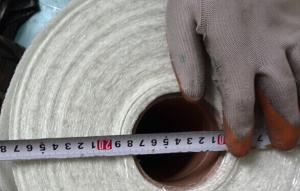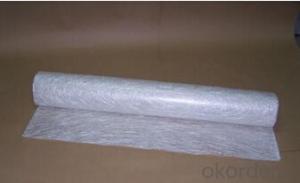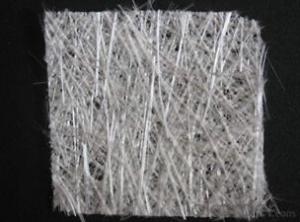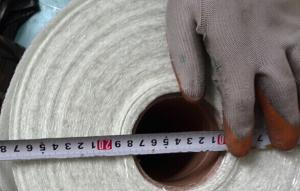E-glass Fiberglass Mat, Powder, 1000mm
- Loading Port:
- China Main Port
- Payment Terms:
- TT or LC
- Min Order Qty:
- -
- Supply Capability:
- -
OKorder Service Pledge
OKorder Financial Service
You Might Also Like
Introduction of E-glass Chopped Strand Mat
Chopped strand mat is made from fiberglass chopped strands boned with powder binder or emulsion binder.
E glass chopped strand mat is made from fiberglass strands chopped to length and bonded together
with powder binder. Chopped strand mat is used primarily for hand lay-up processes, filament winding and press molding of FRP products. Typical products include bathroom
Features of E-glass Chopped Strand Mat
1.Warp and weft rovings aligned in a parallel,flat manner and uniform tension .
2.Densely alighed fibers,providing high dimensional stability ans easy handing .
3.Good moldability,fast and complete resin wet-out ,enabling high productively .
4.Good transporsision and hign strength of the composite products.
5.Even thickness ,no fuzz ,no stain.
6.Fast wet-out ,products with high strength ,little loss for strength in damp situation.
7.fiberglass woven roving has the features of : high tensile strength, corrosion resistance, flame retardance,insulativity.main function
8.applied to hand lay-up process
9.to reinforce UP resin
Features of E-glass Chopped Strand Mat
1.the composit products have high dry and wet tensile strenth and good transparency.
2.Low fuzz ,dirt ,impurity and other stain
Images of E-glass Chopped Strand Mat
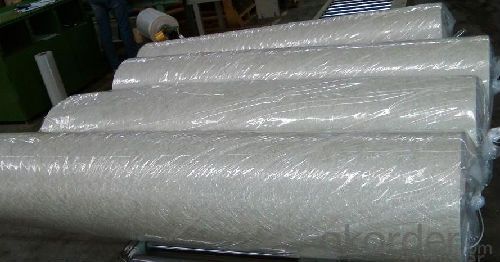
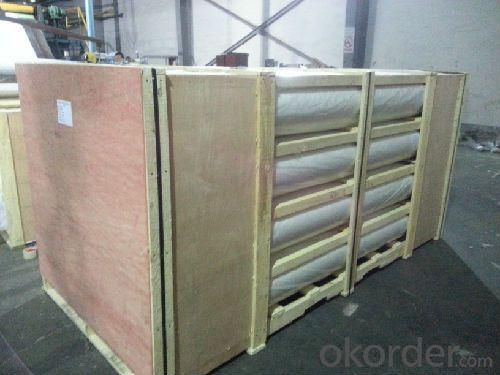
E-Glass Chopped Strand Mat Specification:
Property | Glass type | Weight(g/m2) | Width 200~3300 | Roll Weight | Moisture Content /% | Combustible Content /% | Breakage Strength /N |
Test Method | GB/T 1549 | ISO3374:2000 | ISO3374 | GB/T17470-1998 | ISO3344:1997 | ISO1887:1995 | ISO3342 |
EMC 80 | E-GLASS | 80±16 | ±5 | 6~50 | <0.2 | 13.6±0.35 | ≥200 |
EMC 100 | E-GLASS | 100±10 | ±5 | 6~65 | <0.2 | 9.5±0.35 | ≥170 |
EMC 150 | E-GLASS | 150±15 | ±5 | 6~97 | <0.2 | 8.0±0.35 | ≥40 |
EMC 225 | E-GLASS | 225±22 | ±5 | 6~150 | <0.2 | 5.0±0.6 | ≥60 |
EMC 300 | E-GLASS | 300±30 | ±5 | 6~180 | <0.2 | 4.0±0.6 | ≥90 |
EMC 450 | E-GLASS | 450±45 | ±5 | 6~180 | <0.2 | 3.8±0.6 | ≥120 |
EMC 600 | E-GLASS | 600±60 | ±5 | 6~240 | <0.2 | 3.6±0.6 | ≥150 |
EMC 900 | E-GLASS | 900±90 | ±5 | 6~190 | <0.2 | 3.4±0.6 | ≥180 |
FAQ of Chopped strand mat
1. Why Choose us?
CNBM is a stated own company, provide the guarantee for the best quality, best service and safety business.
2. How will we guarantee the quality?
a, ISO 9001-2008 quality control system;
b, Strict and regular quality control in production;
c, Inspeciation when loading into container before shippment;
d, Sample stock for one year for quality tracing and record.
3. What is your MOQ?
Our MOQ is one pallet.
4. Can you provide sample?
Yes, samples are in stock. we can offer free sample for you.
5. Payment terms?
We can accept L/C, T/T etc.
6. Do you offer OEM service?
Yes, we can print customers’ logo on the packaging;
And the size and specification can be produced and design according to your demand.
7. What is the Production Lead Time?
1 *40HQ each day.
- Q:Is fiberglass mat tissue suitable for underground applications?
- Yes, fiberglass mat tissue is suitable for underground applications. It is commonly used in underground construction projects due to its excellent strength, durability, and resistance to water and corrosion. Additionally, fiberglass mat tissue provides insulation and reinforcement, making it ideal for underground applications such as tunnels, basements, and pipelines.
- Q:Can fiberglass mat tissue be used for acoustic panels?
- Acoustic panels can utilize fiberglass mat tissue for sound absorption. This lightweight material is commonly employed for insulation purposes and is known for its exceptional sound-absorbing properties. By effectively reducing noise levels, it enhances the functionality of acoustic panels. Moreover, fiberglass mat tissue is a preferred choice for DIY projects due to its ease of use. However, it is crucial to consider other factors such as panel design, thickness, density, and installation method to maximize the effectiveness of acoustic panels. Therefore, consulting experts or conducting thorough research is recommended to determine if fiberglass mat tissue is suitable for your specific acoustic panel requirements.
- Q:Is fiberglass mat tissue resistant to acids?
- Yes, fiberglass mat tissue is generally resistant to acids.
- Q:What are the key properties of fiberglass mat tissue?
- Fiberglass mat tissue is a versatile material that possesses several key properties. Firstly, it is made from fine glass fibers that are randomly oriented and bonded together with a binder. This random orientation allows for greater strength and flexibility compared to other materials. One key property of fiberglass mat tissue is its high tensile strength. It can withstand significant amounts of pulling or stretching forces without breaking, making it ideal for applications that require durability and resistance to mechanical stress. Another important property is its excellent thermal insulation capabilities. Fiberglass mat tissue has a low thermal conductivity, meaning it can effectively prevent the transfer of heat. This property makes it suitable for use in insulation applications where it helps to conserve energy and maintain a stable temperature. Fiberglass mat tissue also exhibits good chemical resistance. It is not easily affected by exposure to chemicals, acids, or alkaline substances. This property makes it a suitable choice for applications such as chemical storage tanks or pipes where resistance to corrosion is required. Furthermore, fiberglass mat tissue has excellent moisture resistance. It does not absorb water easily, which makes it resistant to rot and decay. This property makes it suitable for outdoor applications or in environments with high humidity. Lastly, fiberglass mat tissue is lightweight and easy to handle. It can be easily cut, shaped, and installed, making it a convenient material for various applications. In summary, the key properties of fiberglass mat tissue include high tensile strength, thermal insulation capabilities, chemical resistance, moisture resistance, and lightweight. These properties make it a versatile material that can be used in a wide range of applications such as construction, automotive, aerospace, and marine industries.
- Q:What are the different grades of fiberglass mat tissue available?
- There are several grades of fiberglass mat tissue available, ranging from lightweight to heavyweight. These grades are typically classified based on their weight per unit area, with lighter grades being thinner and more flexible, while heavier grades are thicker and more rigid. The specific grades and their corresponding weights may vary depending on the manufacturer, but generally, they are categorized as light, medium, and heavy.
- Q:Can fiberglass mat tissue be used for insulating exterior walls?
- Insulating exterior walls can be done using fiberglass mat tissue. This particular type of insulation material is commonly chosen for its exceptional thermal and acoustic insulation properties. It is composed of fine glass fibers that are bonded together with a binder, resulting in a lightweight and flexible material. When applied to insulate exterior walls, fiberglass mat tissue is typically installed either between the wall studs or in the wall cavities. By trapping air within its fibers, it effectively reduces heat transfer and acts as a barrier against heat loss or gain. This insulation material plays a significant role in enhancing a building's energy efficiency by reducing the need for heating or cooling, thus leading to lower energy costs and carbon emissions. In addition to its insulating properties, fiberglass mat tissue is also resistant to moisture, mold, and mildew, which makes it suitable for external applications. It contributes to creating a more comfortable and healthier indoor environment by preventing the growth of harmful microorganisms and minimizing condensation. Furthermore, it provides an extra layer of safety to the building as it is fire-resistant. To summarize, fiberglass mat tissue is a versatile and efficient insulation material that can be utilized for insulating exterior walls. Its exceptional thermal and acoustic properties, resistance to moisture and fire, make it an excellent choice for improving the energy efficiency and comfort of buildings.
- Q:What are the recommended storage and handling practices for fiberglass mat tissue?
- When it comes to the storage and handling of fiberglass mat tissue, there are a few recommended practices that should be followed to ensure its integrity and longevity. 1. Storage: It is important to store fiberglass mat tissue in a clean and dry environment. This helps prevent any moisture or dirt from damaging the material. Ideally, it should be stored indoors away from direct sunlight and extreme temperatures. 2. Handling: Fiberglass mat tissue is a delicate material that can be easily damaged if not handled properly. It is recommended to wear protective gloves and safety glasses when handling it to prevent any injuries. Additionally, it should be handled with care to avoid any tears or creases that may compromise its performance. 3. Transportation: During transportation, it is crucial to pack fiberglass mat tissue in a way that minimizes the risk of damage. It should be securely packaged and protected from any potential impact or vibration. If possible, it is best to transport it in a dedicated vehicle or container to ensure its safety. 4. Avoid contact with chemicals: Fiberglass mat tissue should not come into contact with chemicals such as acids, alkalis, or solvents. These substances can cause degradation and weaken the material. It is important to handle it with clean hands and avoid any contact with substances that may be harmful. 5. Follow manufacturer's guidelines: It is always advisable to follow the specific recommendations provided by the manufacturer regarding the storage and handling of fiberglass mat tissue. Different manufacturers may have slightly different requirements, and it is important to adhere to them for optimal performance and longevity. By following these recommended storage and handling practices, you can ensure that fiberglass mat tissue remains in good condition, ready for its intended use.
- Q:What is the expected lifespan of fiberglass mat tissue in chemical storage applications?
- The expected lifespan of fiberglass mat tissue in chemical storage applications can vary depending on several factors. These factors include the type of chemicals being stored, the concentration of the chemicals, and the specific conditions of the storage environment. Fiberglass mat tissue is commonly used in chemical storage applications due to its excellent resistance to corrosion and its ability to provide structural reinforcement. However, it is important to note that fiberglass mat tissue is not completely impervious to chemical degradation. In general, fiberglass mat tissue can withstand a wide range of chemicals and can have a relatively long lifespan when properly maintained. It is typically designed to last for several years, with some manufacturers offering warranties ranging from 10 to 20 years. However, certain aggressive chemicals or extreme storage conditions may accelerate the degradation process of fiberglass mat tissue. Chemicals with high acidity or alkalinity, extreme temperatures, or prolonged exposure to UV radiation can potentially reduce the lifespan of the material. To ensure the maximum lifespan of fiberglass mat tissue in chemical storage applications, it is essential to carefully select the appropriate type of fiberglass mat tissue that is specifically designed for the intended chemicals and storage conditions. Regular inspections, maintenance, and proper handling of the chemicals can also help extend the lifespan of the material. Ultimately, it is recommended to consult with the manufacturer or a qualified engineer to determine the expected lifespan of fiberglass mat tissue in a specific chemical storage application, as they can provide more accurate information based on the specific circumstances.
- Q:How does the strength of fiberglass mat tissue compare to other reinforcement materials?
- The strength of fiberglass mat tissue is comparable, if not superior, to other reinforcement materials. It offers excellent tensile strength, high resistance to corrosion, and good thermal insulation properties. Additionally, it is lightweight, flexible, and cost-effective, making it a popular choice in various industries such as construction, automotive, and aerospace.
- Q:How does the porosity of fiberglass mat tissue affect its performance?
- The porosity of fiberglass mat tissue directly affects its performance. Higher porosity allows for better resin absorption, resulting in improved bonding and strength of the fiberglass composite. Additionally, increased porosity enhances the mat's ability to trap and hold air, providing better insulation and soundproofing properties. Conversely, lower porosity may lead to insufficient resin penetration and weaker composite structures. Therefore, porosity plays a crucial role in determining the overall performance and functionality of fiberglass mat tissue.
1. Manufacturer Overview |
|
|---|---|
| Location | |
| Year Established | |
| Annual Output Value | |
| Main Markets | |
| Company Certifications | |
2. Manufacturer Certificates |
|
|---|---|
| a) Certification Name | |
| Range | |
| Reference | |
| Validity Period | |
3. Manufacturer Capability |
|
|---|---|
| a)Trade Capacity | |
| Nearest Port | |
| Export Percentage | |
| No.of Employees in Trade Department | |
| Language Spoken: | |
| b)Factory Information | |
| Factory Size: | |
| No. of Production Lines | |
| Contract Manufacturing | |
| Product Price Range | |
Send your message to us
E-glass Fiberglass Mat, Powder, 1000mm
- Loading Port:
- China Main Port
- Payment Terms:
- TT or LC
- Min Order Qty:
- -
- Supply Capability:
- -
OKorder Service Pledge
OKorder Financial Service
Similar products
New products
Hot products
Related keywords
